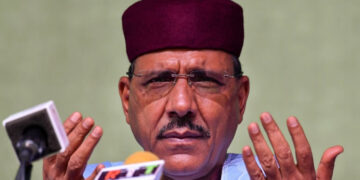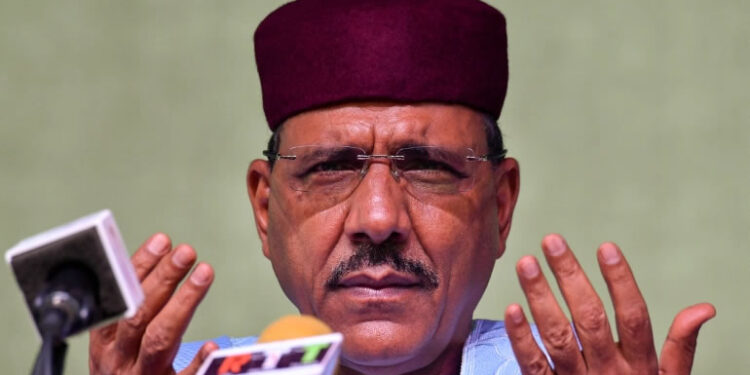By John Ikani
Niger’s military regime announced late on Sunday its intention to bring ousted President Mohamed Bazoum to trial for “high treason.” The regime also criticized West African leaders for imposing sanctions on the country.
In response to the coup that removed democratically elected President Bazoum from power on July 26, the Economic Community of West African States (ECOWAS) has imposed sanctions on Niger. Additionally, ECOWAS hasn’t ruled out the possibility of using force against the army officers behind the coup.
To address the crisis, ECOWAS has approved the deployment of a “standby force to restore constitutional order” in Niger. However, the bloc remains committed to seeking a diplomatic resolution to the situation.
Niger’s military leaders in a statement read by Colonel-Major Amadou Abdramane on national television stated their intention to prosecute Bazoum for “high treason and undermining the internal and external security of Niger.”
Since the coup, Bazoum, aged 63, and his family have been confined to the president’s official residence in Niamey. Concerns have been raised about their conditions of detention. A member of Bazoum’s entourage mentioned that he saw his doctor on Saturday.
Following this visit, the military authorities asserted that the deposed president’s health and that of his family raised no concerns, according to their statement.
Niger’s military leaders have also criticized the sanctions imposed on the country. They claim that these sanctions have resulted in difficulties for people in accessing essential items such as medicines, food, and electricity. The military describes these sanctions as “illegal, inhumane and humiliating.”
“Open to diplomacy”
The military leaders expressed these frustrations when religious mediators engaged with coup leader General Abdourahamane Tiani, a visit that saw the junta leader expressed openness to a diplomatic resolution. The Nigerian Muslim delegation, led by Sheikh Bala Lau, reported that Tiani indicated a willingness to explore diplomacy and peace in resolving the matter.
Tiani explained that the coup was carried out with good intentions, aiming to prevent an imminent threat that would have affected both Nigeria and Niger. However, Tiani expressed disappointment that ECOWAS issued an ultimatum without hearing their side of the matter.
The Muslim leaders’ visit to Niamey was endorsed by Nigerian President Bola Tinubu, who also serves as the head of ECOWAS. Tinubu has taken a firm stance against the coup, which marks the sixth in an ECOWAS member state since 2020.
ECOWAS has responded to the coup by severing financial transactions and electricity supplies. Additionally, borders with landlocked Niger have been closed, impacting vital imports to the country.
Despite issuing a seven-day ultimatum for the restoration of Bazoum, ECOWAS’s deadline has lapsed without compliance from the new rulers. A planned crisis meeting on the coup, scheduled in Ghana’s capital Accra, was canceled due to “technical reasons.”
Support for the new military rulers has manifested in demonstrations in Niamey, with thousands attending concerts in solidarity with the National Council for the Safeguard of the Homeland (CNSP), the group of generals in power. The crowd, predominantly composed of young individuals, displayed flags from Niger, Burkina Faso, Mali, and Russia.
The potential for a military intervention to reinstate Bazoum has sparked divisions among ECOWAS members and has prompted warnings from foreign powers, including Russia and Algeria. Neighboring countries Mali and Burkina Faso, which are also under military governance following coups, have cautioned against such intervention, viewing it as a declaration of war.




































